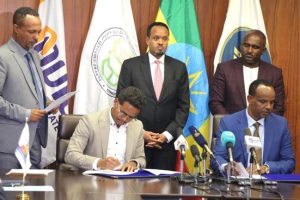
In the multi-polar global power politics and at the time international and regional geopolitics influx, redesigning a foreign policy of national interest which aligns with the dramatic change is imperative to confluence and proceed much more smoothly.
Ethiopia has a longstanding history of diplomatic relations with its neighboring and other international countries. For instance, during the reign of Emperor Haile Selassie, the country had strong relations with western counties. At the time of the Derg regime, country’s foreign relations were highly confined to countries that follow similar ideologies- Socialism. And in sharp contrast to the former regime, it had close relations with former Soviet Union and other – allied countries.
In the same way, the government led by the Ethiopian People’s Revolutionary Democratic Front (EPRDF) has kept on the track of diplomatic relations with the western and the rest of the world based on the mutual interest of the nations. On the other hand, the current Foreign Affairs and National Security Policy and Strategy (FANSPS) of Ethiopia, was introduced in 2002.
The policy, adopted based on inside-out approach, encompasses a wider range of issues and sees poverty, bad governance and lack of democracy as the major threat of the country. Thus, it gives due emphasis on promoting the nation’s economic and political development by creating conducive environment. As a result, unlike the past policies of the two regimes, this one has yielded considerable rewards in many ways.
However, this does not mean that the policy document is entirely perfect. Rather, it lacks a lot of elements which have profound impacts on country’s affairs and central to be incorporated in the policy. As well, it fails to take account of the ongoing global dynamism to some extents. In different words, the aforementioned FANSP had not well thoughtout that the international geopolitics has been through dramatic shifts over the decades which it fails to embrace. Due to the fact that Ethiopia has now embarked on unprecedented reforms, significant changes are registered in the political and economic spheres.
For instance, the new development in the Horn region together with the peace agreement between Ethiopia and Eretria, regional and continental cooperation and integration are some of the major achievements it has gained over the past few months. These and other important successes coupled with the issue of peace and security, hence, compel the country to take a deeper look into its foreign policy and refrain it in accordance with the internal and external changes, is order of the day.
As the revisit of the FANSP should not be argued on, the question is ought to be how and what contents to the policy. Therefore, it needs to be well investigated not only buy the representatives of the ruling party, but with the corresponding professionals, politicians, youth and elders of the nation to build a great nation again.
The revisit must not also undermine the international political, economic, social and environmental dynamism with the impact of the future technology on security and other human needs. It should analyze and forecast the future of prosperous Ethiopia’s diplomatic relation with the region, continent and beyond the current economic status.
Likewise, the already built strong relations need to be thought out well to be strengthened and broadened. The pillars of ‘medemer’ also require focus. There should be no compromise on the pillars rather the center of the FANSP. Vibrant democracy, economic vitality, and Regional Integration with openness to the world must be given critical place.
The Ethiopian Herald, February 13/2019
BY MENGISTEAB TESHOME




